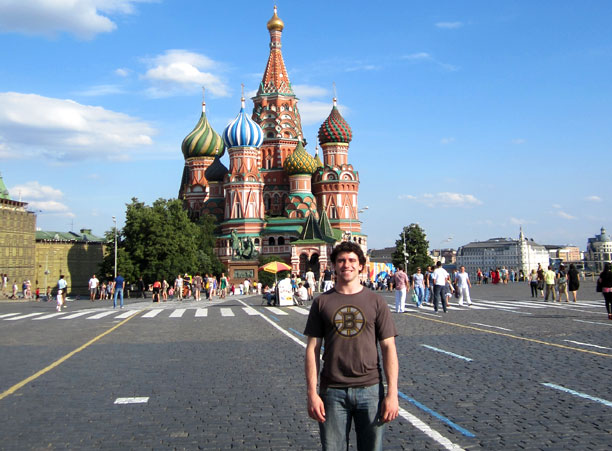The Holy Cross Summer Study Abroad program is proof that good things come in small packages: The intense four- and six-week overseas courses have increased in popularity since their introduction five years ago.
This summer, 98 Holy Cross students headed to Jerusalem, London, Luxembourg, Moscow, Paris, Rome and several sites in Peru. That’s up from 60 students in 2007, the program’s inaugural year, says Brittain Smith, director of Study Abroad. (Other programs offered less frequently include Kenya, Southeast Asia and South Africa.)
“We want students to have different opportunities,” says Smith, who helped develop the summer program as a complement to the College’s semester-long and yearlong overseas programs. “We hope it will stimulate students to teach abroad, go into the Peace Corps, or get a Fulbright Scholarship.”
Options for a Busy Schedule
Hockey player Jeffrey Reppucci ’14 didn’t think international study could fit into his College experience because his athletic responsibilities tie him to the ice rink during the traditional academic year. But at the urging of his Russian instructor Dr. Olga Partan — and after consulting with his coaches — Reppucci spent this past June and July enrolled in the brand-new Holy Cross Moscow Summer School, an intensive Russian language course and cultural program.
“My Russian skills in six weeks multiplied by six,” says Reppucci, who now qualifies to skip second-year Russian classes at Holy Cross and jump right into third-year classes as a sophomore. More importantly, he found his passion: He plans to declare himself a Russian major. “The Russian program at Holy Cross absolutely just captured me,” he says.
The rigorous program was created with the help of Partan, who was born and raised in Moscow. Professors from the Russian State University for the Humanities customized lessons for the eight Holy Cross students, who spent four hours a day in class.
“The Moscow program is really made for the specific needs of Holy Cross students,” says Partan. “It’s very creative and experimental.”
But it wasn’t all work and no play. All Holy Cross summer abroad programs incorporate cultural activities as a critical piece of the learning experience. Partan, who traveled to Russia with her students, was delighted to introduce them to the best of Moscow culture, from museums and architecture to the Bolshoi Ballet.
“I knew absolutely nothing about ballet,” says Reppucci, who now counts himself a fan. “I was under the impression it was a bunch of people wearing black leotards. I had no idea what an extravagant production it is.”
Despite its short duration, the Moscow summer program will have a lasting impact on Holy Cross. “Because Moscow is an intensive language program, the students advance a full year in the language,” says Smith. “That significantly raises the level of the curriculum in the Russian section.”
First-Year Students Wanted
Summer study abroad programs are open to all Holy Cross students, but first-year students are particularly encouraged to attend a program before their sophomore year. “Our hope is if students go abroad for a summer program, they’ll also want to go again their junior year,” says Smith.
Colleen Curran ’11 attended a summer program at Oxford University in England in 2008. “I knew I wanted to study abroad, but I didn’t know if I wanted to spend an entire year overseas,” she says. After a successful summer abroad, Curran returned to Oxford for her junior year. And this September, the recent Holy Cross graduate is heading back to Oxford for a master’s degree.
Both Students and Faculty Benefit
Most summer programs are designed, led, and/or taught by Holy Cross professors. Take the London program, British Theatre in Perspective. It was taught by two Holy Cross professors who turned England into their classroom, taking students to 24 theater shows, 27 museums, and two concerts in 28 days.
“One of the real benefits of this model is it lets faculty teach abroad in their subject area, in situ,” says Smith. “It is faculty development and student development at the same time, and a process of internationalization for both.”
By Christine Hofmann-Bourque
Related Information:
Summer Study Abroad Programs Expand Students’ Worldview
With 10 sites across the globe, the Holy Cross classroom goes international
Read Time
3 Minutes
